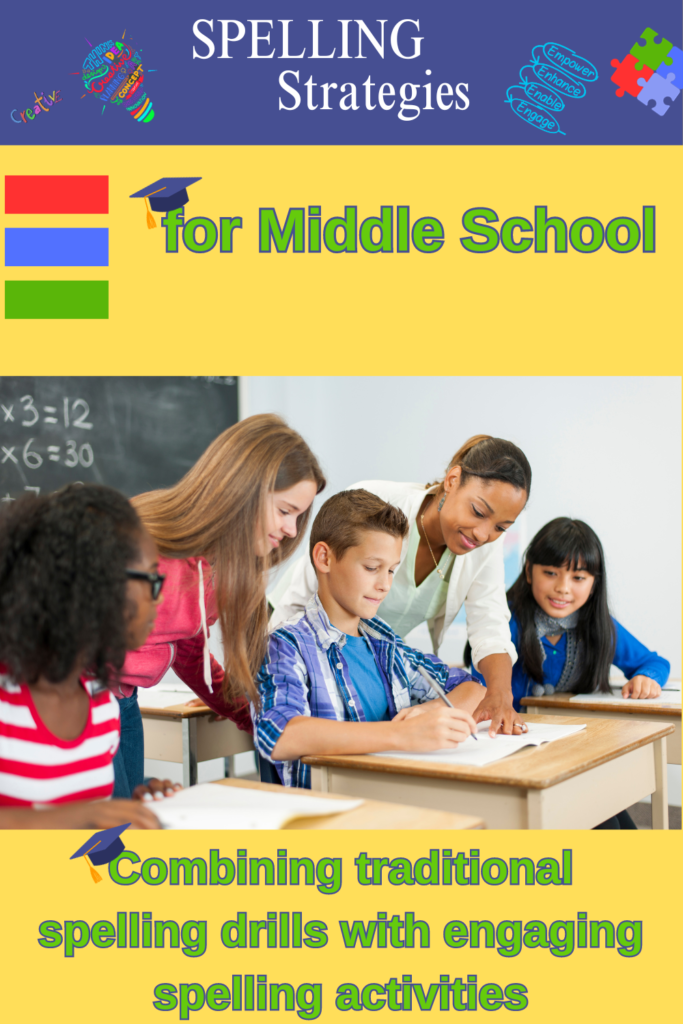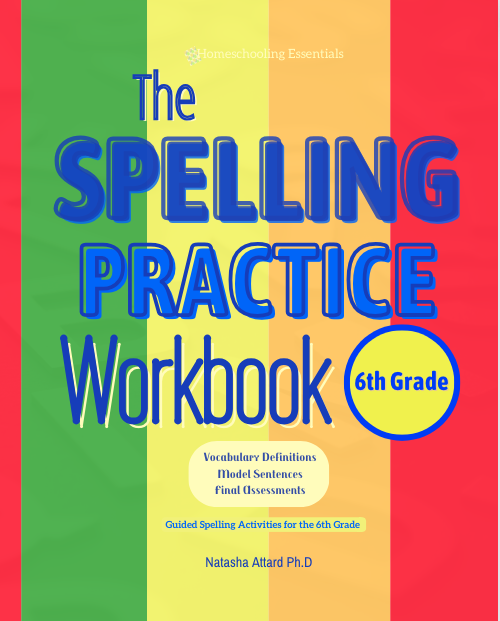Spelling Strategies: Teaching Spelling in Middle School

Middle school is a crucial period for language development, and one area that often needs attention is spelling.
Effective spelling instruction not only improves students’ writing skills but also enhances their overall language proficiency. In this article, we’ll explore some practical strategies for teaching spelling in middle school and introduce how my spelling workbooks can help your students achieve spelling success.
The Importance of Spelling in Middle School
Middle school is a transitional phase where students begin to tackle more complex writing assignments. Accurate spelling becomes increasingly important as it impacts their ability to convey their thoughts effectively. Proficiency in spelling isn’t just about getting the right letters in the right order; it’s about ensuring that young minds can express their ideas clearly and confidently. Recognizing the diverse learning styles of students, an optimal approach for teachers in spelling instruction combines a blend of modern and traditional spelling strategies. This comprehensive strategy encompasses both engaging and enjoyable activities and the often-overlooked, but essential, spelling drills. By striking this balance, educators can cater to various learning preferences and ensure that students not only find spelling enjoyable but also build a strong foundation in this fundamental skill.
Engaging Spelling Lessons
Word Lists: Creating a Connection to Learning
In our teaching journey, we’ve discovered the power of personalized word lists. Imagine the spark in your students’ eyes when they encounter words relevant to their interests and the curriculum. By creating word lists tailored to their passions, we keep them engaged and motivated to learn. When learning is connected to their world, it becomes a thrilling adventure. There are a number of strategies that you can use to compile fun and engaging word lists to base your spelling activities on:
1. Theme-based Spelling Lists
Create spelling lists around interesting themes or topics that resonate with your students’ interests. For example, if your class is passionate about space, compile a list of words related to astronomy, planets, and space exploration. Theme-based lists not only make spelling more enjoyable but also enhance vocabulary in context. Students can then select a few words from the list, write a short paragraph or story related to the chosen words and discuss their writing in class.
2. Student Involvement
Involve your students in the process of selecting spelling words. Ask them to find words in a reading book, that they find challenging or intriguing. By giving students a voice in choosing the words they’ll study, you increase their ownership and motivation to learn. You can then introduce ‘Word Show-and-Tell’ activity where students present their chosen words, explain their meanings and give examples of how they used the words in sentences/short story.
3. Word Exploration and Discovery
Turn spelling into an exploration adventure. Introduce a “Word of the Day” or “Word of the Week” program where students research and present interesting facts about the selected word. This strategy encourages curiosity and a deeper understanding of word meanings and origins. You can implement this strategy in a ‘Word Detective Challenge’. Assign a student to be the word detective for the day. heir task is to research the selected word, find interesting facts, and share their discoveries with the class.
4. Word Families and Patterns
Group words in your spelling list by common patterns or word families. For example, focus on words with similar prefixes, suffixes, or root words. Challenge students to categorize the words based on these patterns and create their own word family trees or charts. This approach helps students identify spelling patterns and makes it easier for them to apply spelling rules across various words.
5. Word Games and Challenges
Incorporate word games and challenges into your spelling lessons. Create spelling competitions where students can earn points or rewards for correctly spelling words. Interactive activities like word searches, crossword puzzles, and word scrambles can also be based on the spelling list, making learning more engaging. You can organize a fun and competitive “Spelling Bee” event based on the spelling list. Students take turns spelling words from the list, earning points for each correct spelling.
Spelling in Syllables
In middle school, the approach of spelling in syllables is often overlooked, as educators strive to strike a balance between engaging, enjoyable activities and the essential but sometimes less exciting spelling drills. However, it’s crucial to recognize that spelling in syllables serves as a foundational spelling strategy that enhances students’ understanding of word structure and pronunciation.
Less Boring Spelling Drills
To incorporate this strategy seamlessly with other engaging activities, educators can begin by integrating it into themed-based spelling lists. For example, students can dissect theme-related words into syllables to deepen their grasp of spelling patterns. Furthermore, involving students in selecting challenging words and conducting word exploration and discovery activities using syllables can make the process interactive and educational. Additionally, when exploring word families and patterns, highlighting syllables within related words can aid in recognizing similarities and differences. Finally, during word games and challenges, incorporating syllable awareness can be part of the fun. This comprehensive approach to spelling strategies ensures that students not only enjoy their learning experience but also build a strong foundation in spelling skills.
Using Spelling Workbooks as one of your Spelling Strategies

Lesson 1 of the Spelling Practice Workbook for 6th Grade lists the following words to be learned: adjacent, blown, catastrophe, disastrous, equator. An identifiable theme could be ‘natural disasters’ and the objective could be to reinforce the spelling of words related to natural disasters while using the spelling strategy of theme-based spelling lists. Here’s an example of how you can conduct this lesson using the theme-based spelling strategy combined with the Spelling Practice Workbook for 6th Grade.
- Introduction to the Theme:
- Begin the lesson by introducing the theme of “Natural Disasters” to your students. Explain that they will be working with words related to various natural catastrophes and phenomena.
- Word Selection:
- Present the following words from the Spelling Practice Workbook for 6th Grade to your students, explaining their meanings and associations with natural disasters:
- adjacent
- blown
- catastrophe
- disastrous
- equator
- Present the following words from the Spelling Practice Workbook for 6th Grade to your students, explaining their meanings and associations with natural disasters:
- Spelling Context:
- Discuss how each word relates to natural disasters. For example:
- “Adjacent” can describe areas that are near each other and could be affected by the same disaster.
- “Blown” might refer to strong winds in a hurricane or tornado.
- “Catastrophe” signifies a major, often devastating event.
- “Disastrous” amplifies the impact of a catastrophe.
- “Equator” can be related to tropical storms and cyclones that often form near the equator.
- Discuss how each word relates to natural disasters. For example:
- Spelling and Vocabulary Practice:
- Encourage students to incorporate these words into sentences or short paragraphs that describe various natural disasters. For example:
- “The town located adjacent to the river was devastated by the flood.”
- “The hurricane’s winds had blown away entire neighborhoods.”
- “The earthquake was a catastrophic event, causing widespread destruction.”
- “The disastrous consequences of the tsunami were felt across the region.”
- “Tropical storms often originate near the equator.”
- Encourage students to incorporate these words into sentences or short paragraphs that describe various natural disasters. For example:
- Thematic Exploration:
- Further explore the theme by discussing different types of natural disasters, their causes, and their impact on the environment and communities. This contextual understanding reinforces both spelling and vocabulary.
- Homework Assignment:
- Assign homework that involves researching and writing short reports or presentations on specific natural disasters, using the vocabulary from the theme-based spelling list.